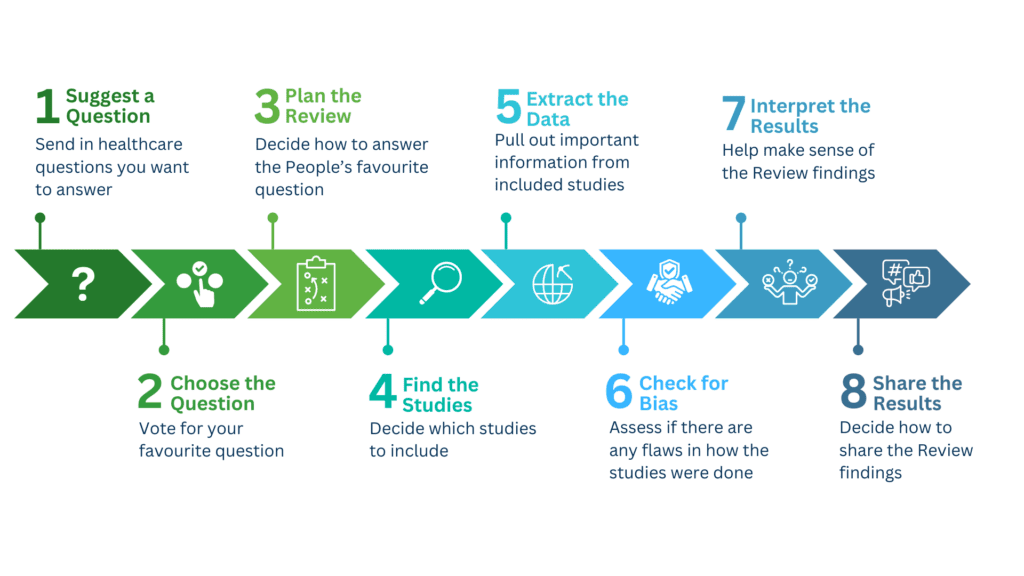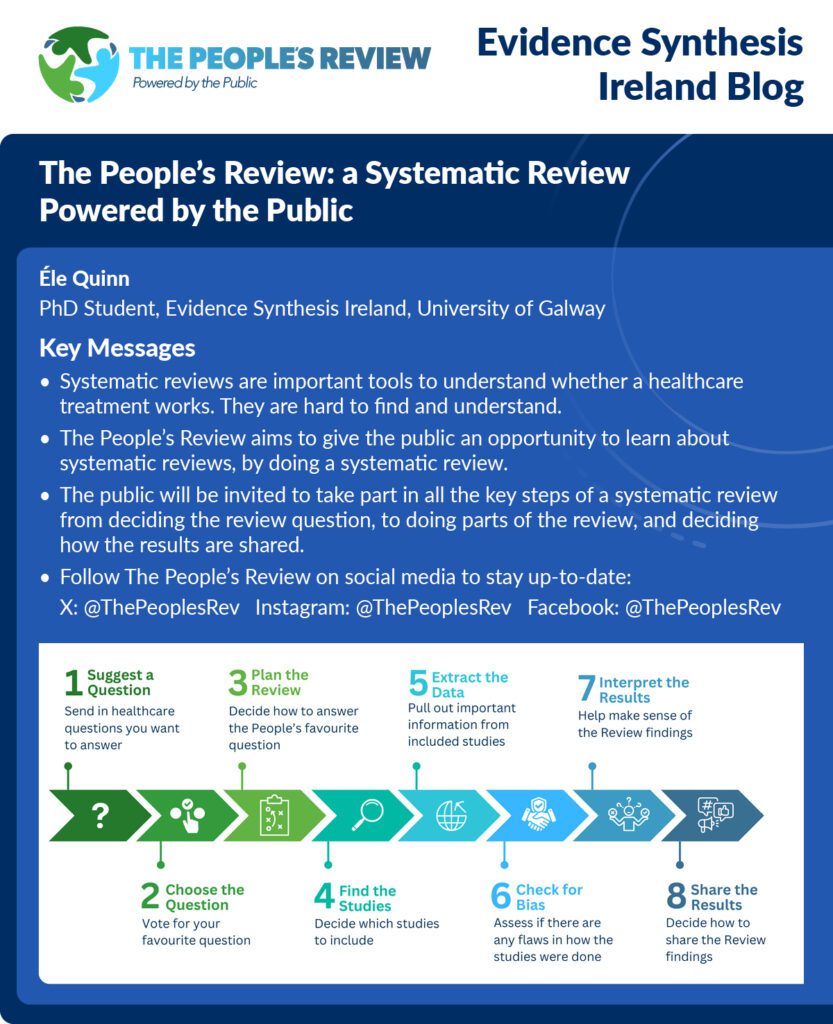In this blog, Éle Quinn, PhD student with Evidence Synthesis Ireland at the University of Galway, explains what her project – The People’s Review is all about.
It is difficult to make health decisions. We are exposed to a huge amount of information available 24/7 on our smartphones. It is easy to find all sorts of news, figures, and advice about healthcare. However, not everything is reliable. Our decisions should be based on the best evidence available — but how do we find it? Systematic reviews can help. A systematic review is a tool used by researchers, clinicians, and others to find all the evidence that has been published about a healthcare treatment. Systematic reviews use clear and careful steps to find relevant studies, assess the trustworthiness of the studies, and put together the results of those studies. This method gives patients the best evidence available about whether a healthcare treatment works or not. However, systematic reviews are complex and hard to understand. The People’s Review aims to give the public an opportunity to learn about systematic reviews, by doing a systematic review.
So, what is The People’s Review?
The People’s Review is an online project inviting members of the public to take charge of a systematic review. It will be a systematic review for the public, and importantly, by the public. We want to help the public understand what systematic reviews are, why they are important and how they can be used to make everyday health choices. What better way to do this this than by giving the public an opportunity to get their hands dirty and learn about systematic reviews, by doing a systematic review.
What will The People’s Review involve?
The People’s Review is broken down into eight separate stages that complement the key steps in a systematic review. The public will be invited to suggest and choose the review question, plan the review, do parts of the review, and decide how the results are shared. It will all take place online. We will help the public along the way with animated videos, training and interactive elements.

Who can get involved?
The People’s Review will be open to everyone, anywhere in the world. All you need is a phone, laptop, or tablet! You don’t need any previous experience with health research or systematic reviews. Indeed, The People’s Review is designed specifically for people with no experience of health research at all!
Why do a People’s Review?
In an age of misinformation, information overload and ‘Dr Google’, it is so important that people are equipped to think critically about health information and to find and use evidence when they need to make health choices. Taking part in The People’s Review will help people gain the knowledge and skills to be able to do this.
We also believe that the public have a right to be involved in research. The People’s Review opens up the wonderful world of systematic reviewing to the public. It gives the people an opportunity to have their say and decide what our review will focus on, plan our review and do parts of the review.
How did The People’s Review come about?
In 2020, The People’s Trial launched online as an opportunity for members of the public to take part in designing and participating in an online randomized trial, in an effort to support the public’s understanding of randomized trials. Over 3000 people from across the globe were involved in conducting a randomized trial to answer the question: ‘Does reading a book before bed increase your sleep quality compared to not reading a book before bed?’.
More recently The People’s Trial approach has been adapted for kids in – The Kid’s Trial. The scientists of tomorrow are currently deciding what question they will answer with a randomized trial.
We were inspired by the success of The People’s Trial and The Kid’s Trial are using a similar approach to The People’s Review but with the aim of supporting the public to understand what systematic reviews are and why they matter.
Who is working behind the scenes on The People’s Review?
I (Éle) am a PhD student and The People’s Review is the focus of my PhD, I’ve been working on The People’s Review for almost two years now, trying to bring The People’s Review to life….time flies when you’re having fun!
I am lucky to be working with a fantastic group of people on this unique project…..it takes a village! Sinéad Hynes, Chris Noone and David Moher are my PhD supervisors and the project wouldn’t be the same without them.
I also established an international steering group, made up of people with varied experience and expertise – including of course, four fantastic public partners – Derek Stewart, Charlene Young, Maureen Smith and Jeremy Holt. We also have five researchers in the Steering Group – Patricia Logullo, Shaun Treweek, Shoba Dawson, Shahed Hossain and Ann O’Brien, who bring expertise in systematic reviewing, communication, public involvement and online engagement.
Anna Noel-Storr, Gordon Dooley and David Anstee of Cochrane Crowd are also involved in The People’s Review. Cochrane Crowd is a citizen science platform that currently hosts a variety of tasks related to the production of systematic reviews that the public can take part in. The People’s Review will be hosted within Cochrane Crowd.
The People’s Review is funded by the Health Research Board (Ireland) and the HSC Research and Development Division of the Public Health Agency (Northern Ireland) through Evidence Synthesis Ireland and Cochrane Ireland. There are so many people and supporters within the Evidence Synthesis Ireland network who are helping out behind the scenes with The People’s Review….too many to name! As I said…..it takes a village!
Stay up-to-date with The People’s Review
At the moment we are getting ready to launch The People’s Review and hope to launch by the end of 2024. Stay tuned for the pre-print of The People’s Review Protocol – describing in detail how we plan to involve the public.
For now, you can follow us on social media to keep up to date with opportunities to participate. You can email ThePeoplesReview@universityofgalway.ie or e.quinn34@universityofgalway.ie if you have any questions about the project.





